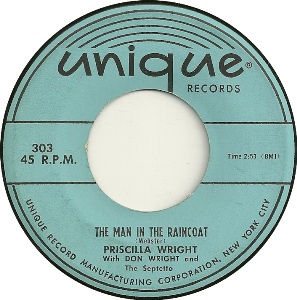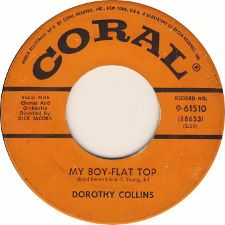| |
Priscilla Wright

The Man in the Raincoat / Please Have Mercy - 7"
Unique - 1955
Michael Panontin
|
In the early 1950s Don Wright was known as Canada's Jingle King. The London (ON) bandleader had written tunes in praise of soap, gas stations, chocolate bars and even Carling's Red Cap Ale. But it was a ditty he had penned for Bromo-Seltzer - "Lum-dum-da-dum da-dum da-dum," it went, "I'll take Bromo for fast relief" - that gave him a taste of the big time. In fact, it was such a success that record companies came looking for the sophisticated lady who sang it.
That voice belonged to Wright's daughter, Priscilla, a 14-year-old schoolgirl with braces still on her teeth. Wright signed a record deal with the local Sparton label and then had Priscilla record some tracks in the studio at CFPL-AM, where he worked as manager. It wasn't long before the brooding 'The Man in the Raincoat' started racing up the charts in Canada.
The song was written by a man named Warwick Webster, an illustrator of technical manuals at Avro Aircraft who took to fiction writing and composing in his spare time. Webster was sitting in a Toronto restaurant one rainy evening when he caught sight of a man with a woman carrying a suitcase walking outside in the street, thus giving rise to the song's opening line, "Late in the evening, out in the square / A man in a raincoat standing there." How the song's Edward Hopper/film noir qualities resonated so well with a young girl from sleepy London is anyone's guess. "My little soul just went into it," is how Priscilla explained it years later to The Globe and Mail.
'The Man in the Raincoat' was issued south of the border on the Unique label. Billboard originally panned the song in its April 30th (1955) issue, writing that "material like this requires technique and stylistic subtlety that the singer fails to muster". But by June 18th the influential mag had relented, calling it a "chart threat" in a number of northern cities and admitting that "the young singer may find herself with an American hit".
Things really started to take off for the teenager that summer when she was invited to appear on Ed Sullivan's Toast of the Town TV show in July. That was followed in October by a show in a Cleveland suburb hosted by the deejay Bill Randle, a bill that featured Pat Boone, the Four Lads, Bill Haley and His Comets, and a newish singer named Elvis Presley (who was making his first appearance north of the Mason-Dixon line).
There were many recordings of 'The Man in the Raincoat' that year, including versions by Marion Marlowe, Karen Chandler and Lita Roza. Claudine Longet also sang a typically weird rendition of it in 1967, a year before her appearance as aspiring actress Michele Monet in Blake Edwards' The Party. But Priscilla's record is considered by most to be the best.
Her family was quite naturally proud of her achievement. But perhaps none was more so than her maternal grandfather, former Prime Minister Arthur Meighen. "I don't know the first thing about music," he told Maclean's magazine, "but I know Priscilla is a success, so she must have worked hard and have talent."
Unique would issue a number of her singles throughout the 1950s, but nothing really clicked like 'The Man in the Raincoat'. And though she was offered additional movie and recording contracts, her parents saw to it that she finished her education instead, with the singer graduating from the University of Toronto and later marrying five-time MP Geoff Scott. Priscilla finally managed to revive her career several decades later, charting in 1985 with a version of Michael Bolton's 'Heartbeat' and then again in 1988 with a revisiting of 'The Man in the Raincoat'.
|
|
Suggestions

Dorothy Collins
My Boy - Flat Top / In Love - 7"
Coral
|








